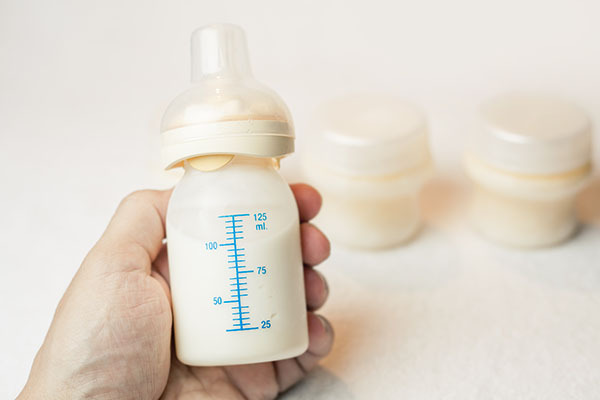In this article:
Breastfeeding allows the new mother to connect with her infant, both physically and emotionally. It familiarizes the baby with their mother’s touch and familiarizes the mother with her newborn’s temperament. This is one parenting activity that is solely reserved for the mother. Plus, mother’s milk is the ideal source of nutrition for infants. (1)

Milk production is regulated by the maternal hypothalamus and pituitary gland-derived hormones. (1) Oxytocin and prolactin are the main hormones that play roles in milk production and the resulting let-down reflex. (1)
There is no age limit for breastfeeding, but the consensus is that a healthy child should transition from breast milk or infant formula by the age of one.
The American Academy of Pediatrics (AAP) and Academy of Breastfeeding Medicine (ABM) have reached an official consensus that breastfeeding exclusively is recommended until 6 months of infant life. (2)
An increasing number of studies on allergies that follow LEAP indicate the early introduction of complementary food between the ages of 4 and 6 months decreases a child’s risk of allergies. (3)
Advantages of Breastfeeding for Both the Mother and Baby
In most studies on breastfeeding benefits, researchers have examined breastfeeding exclusively for 4–6 months. (4) The consensus is that breast milk is the best baby food, which is good for the infant and the mother alike. Here’s how breastfeeding benefits the baby and mother:
For the baby:

1. Provides the baby with colostrum in the first few days
Human colostrum is the first fluid a mother produces soon after delivery. It is generally low in volume (5) in the first few days postpartum. It is nutrient rich and contains many immunologic components.
Colostrum is different from mature milk due to the former’s low concentration of lactose, potassium, and calcium but high content of fat, protein, magnesium, and chloride, which supports infant growth better. (5) Colostrum also contains many immunological components, such as secretory IgA, lactoferrin, leukocytes, and other developmental factors, which improve the infant’s immunity. (5)
2. Breastfeeding supports the baby’s growth and development
With the improvement in the infant-mother dyad and other health benefits, breastfeeding is a great way to support infant growth and development, (6) both physically and mentally.
3. Breastfeeding may increase the brainpower of the baby
While breastfeeding has numerous benefits, no reputable study has proven the idea of breastfeeding helping to improve a child’s IQ. However, breastfeeding does help create a stronger mother-infant dyad, which in turn improves the child’s overall development. (7)
4. Breastfeeding promotes a healthy digestive system
Exclusively breastfeeding infants have different gut bacterial flora than formula-feeding infants. It has long been hypothesized that early bacterial flora changes resulting from formula feeding make a formula-feeding infant more prone to gastrointestinal infections and atopy disease than a breastfeeding infant. (8)
Breastfeeding transfers immune-boosting antibodies from the mother to the baby, which offer protection against a number of acute gastrointestinal infections. Another reason why breast milk trumps formula is that breast milk is easier to digest, which leads to a reduced incidence of diarrhea (9) or constipation.
5. Breastfeeding reduces the number of ear infections in young infants
The antibodies present in breast milk help bolster the baby’s overall immunity against various illnesses, including ear infections. (10) Formula milk is devoid of these antibodies, which explains why formula-fed infants are more prone to ear infections than breastfed ones.
6. Breastfeeding lowers the risk of necrotizing enterocolitis for preterm infants
Necrotizing enterocolitis is a gastrointestinal condition that commonly affects premature babies and can be life-threatening. It involves inflammation and the gradual death of intestinal tissue. The dead tissue easily becomes perforated and leaks bacteria from the intestine into the belly or bloodstream to cause severe infection.
Feeding your newborn only breast milk during the initial 6 months after premature delivery can reduce their risk of developing this condition. (11)
7. Breastfeeding reduces the number of atopy diseases infants contract, such as asthma and eczema
Nursing mothers pass on their antibodies to their babies through breast milk, which then protects their little ones from atopy diseases such as asthma and eczema. (12)
8. Breastfeeding decreases the child’s risk of endocrinopathy, such as type 2 diabetes
Breastfed babies are less likely to get type 1 diabetes and become overweight or obese during adulthood. Too much body weight puts one at an increased risk of type 2 diabetes, so breast milk protects your child from that possibility as well. (13)
9. Breastfeeding lowers the risk of sudden infant death syndrome (SIDS)
Breastfeeding is one of the best ways to prevent SIDS, wherein an otherwise healthy infant succumbs to sudden death without an explicable cause. This usually occurs during sleep. (14)
For the mother:

1. Breastfeeding reduces the chance of close-interval pregnancy
Promotion of breastfeeding could help to reduce short birth intervals. (15)
2. Breastfeeding promotes faster and easier recovery from childbirth
It does so by releasing a hormone called oxytocin, which makes the uterus shrink to its normal size more quickly and also curbs postpartum bleeding. (16)
3. Breastfeeding lowers the risk of ovarian and breast cancers
Estrogen is a female sex hormone, and higher estrogen exposure within the female body has been associated with an increased risk of ovarian and breast cancers. Lactation lowers this risk factor by curbing the woman’s lifetime estrogen exposure. (7)
4. Breastfeeding aids in the mother’s weight loss
Breastfeeding mothers burn about an additional 500 calories daily, so they have a much easier time losing their pregnancy weight than mothers who do not breastfeed. (17)
5. Breastfeeding reduces the risk of depression in mothers
Breastfeeding helps newborns and mothers create a stronger mother-infant dyad, which in turn reduces the mother’s postpartum anxiety and depression. (18)
6. Breastfeeding helps in building the mother-baby bond
The mother-baby bond is established through both neuroendocrine chemical signaling pathways and engendering closeness in the mother-infant dyad.
Breastfeeding is good for the infant-mother dyad, creating a theoretical mechanism through endocrines released from the mother to the infant and through the physical closeness between the mother and infant to create bonding. (19)
Numerous studies have shown improvement in infant-mother bonding through breastfeeding. (20)
Drawbacks of Breastfeeding
One of the biggest drawbacks of exclusively breastfeeding infants is the resulting higher risk of jaundice. (21) Exclusively breastfeeding infants have an increased risk of jaundice for many reasons, mostly the inadequate volume a child receives from the mother in its first few days of life. (21)
Therefore, it is imperative that all exclusively breastfeeding mothers breastfeed as frequently as possible during the neonatal period to increase their breast milk production and provide the child an adequate volume to reduce its risk of hyperbilirubinemia.
Difference Between Normal Milk and Breast Milk

Human breast milk and formula have many differences. Although all formula is made to mimic human breast milk, no formula can be the same as breast milk as human milk is constantly evolving and tailored to each individual infant.
One of the ingredients that infant formula cannot replicate is secretory IgA, along with other immunological signals. Immunoglobulin and immunological ingredients are only produced in the mother, and these ingredients are very unstable; therefore, only a breastfeeding child would receive the immunological ingredients from the mother. (6)
Other than the immunological component, breast milk also has a continuously evolving casein to whey protein ratio and carbohydrate consistency. (6)
Self-Care Measures for Both Mother and Baby When Breastfeeding
- For exclusively breastfeeding infants, frequency of feeding is always more important than duration of feeding. (22)
- Direct breastfeeding has numerous benefits that express breast milk, donor breast milk, and formula feeding cannot provide.
- While breastfeeding has numerous benefits, for some infants, a short duration of formula feeding to bridge the child during the neonatal period can prevent them from readmission due to excessive weight loss or jaundice.
Most-Asked Questions About Breastfeeding
What are the telltale signs that a baby is being adequately breastfed?
Multiple signs will show the infant has fed enough. They are generally calmer with less irritability. They will stop showing cueing signs, such as rigorous sucking, lip smacking, and fisting.
Does breast milk have any effect on immunity against sickness later in the life of the baby?
Yes, breast milk protects mostly against ear and gastrointestinal infections early in childhood. It also prevents children from developing atopy illnesses, such as asthma, eczema, and allergies. (23)
How often should a baby be breastfed in a day?
It depends on the child’s age and overall medical condition. A newborn baby without any acute or chronic illness should feed every 2–3 hours on demand around the clock.
All exclusively breastfeeding mothers should remember that most mothers produce either barely enough or less-than-enough breast milk for their infant within the first week of the infant’s life because the neuroendocrine signal for breast milk production is released in a pulsatile manner.
It is important to remind breastfeeding moms to feed frequently to provide the child adequate calories and volume while increasing her breast milk at the same time.
As the child grows older and becomes more efficient at breastfeeding, it is okay to decrease feeding frequency. As a simple rule of thumb, if the child has regained their birth weight and is breastfeeding well, it is appropriate to discontinue the overnight feeding if parents desire. As the infant grows, less frequent feeding is necessary.
At the same time, a healthy infant will determine the feeding frequency and amount they need. The amount and frequency each child needs depend greatly on their weight and overall health.
For how long should a baby be fed at a time?

The infant should determine the duration of feeding. At the same time, exclusively breastfeeding mothers should always remember that frequency of feeding is always more important than the duration of feeding.
An excessive amount of time for the infant to breastfeed may cause more harm than good because the child will spend way too much energy feeding rather than obtaining that energy.
Final Word
Infants are born with zero antibodies, so their disease-fighting abilities are at an all-time low in the initial days of life. Plus, their digestive system is quite nascent, which is why they can’t stomach any food except breast milk, which is relatively easy to digest.
During this phase, babies derive antibodies and nourishment solely through breast milk. Formula milk is the less preferred alternative, as it runs low on nutrition, is more difficult to digest, and has zero antibodies. Plus, breastfeeding helps the mother in various ways as well.
As a pediatrician and lactation specialist, I routinely recommend all parents transition their children to whole milk by the 1-year well-child check and consider supplemental solid food by the 4- or 6-month well-child check.
- Was this article helpful?
- YES, THANKS!NOT REALLY


